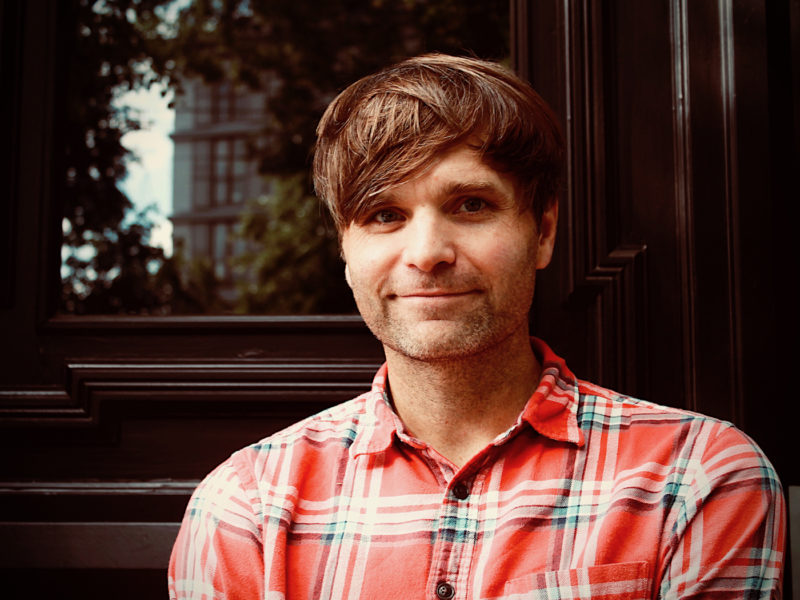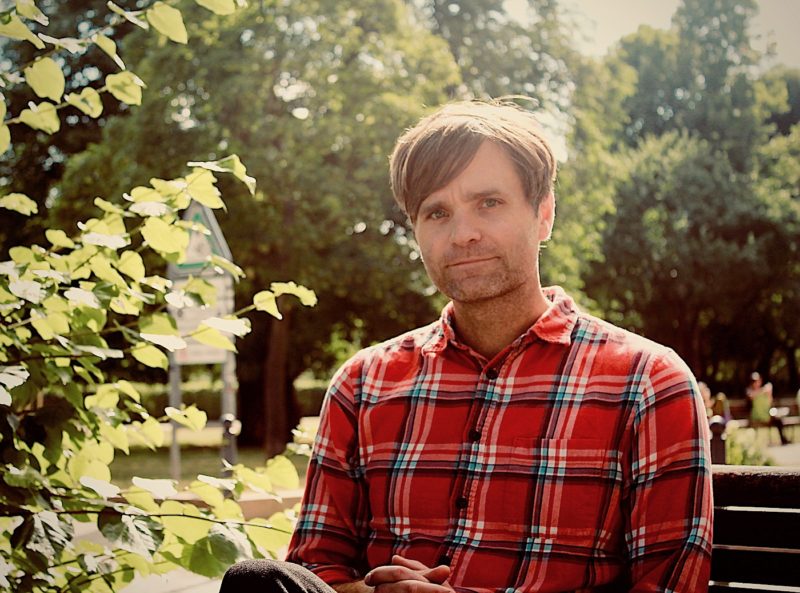When was the last time you took comfort in seeing something old and familiar that triggered lot’s of beautiful memories? Pieces from the past that were awoken by running your fingers over old wood, seeing a crack in the wall of your favourite place or hanging on to the smell of a particular object? Way too often, we think it’s been too long probably. The idea of ever-changing places that are desperately trying to become urban melting pots at a great speed becomes more and more present instead. Say hello to gentrification.
The alarming result of it all has at least inspired Death Cab For Cutie to deal with this issue throughout their 9th album Thank You For Today. The theme of people and places changing and eventually disappearing not only finds its way onto their new single Gold Rush, it becomes somewhat the main topic of the whole record as well as our conversation with Death Cab For Cutie’s leading man Ben Gibbard who shares his thoughts on gentrification as well as his adopted hometown Seattle and his need for structure as well as humour in his life with us.

Photo by Annett Bonkowski
Sitting only a stone’s throw away from some of Berlin’s oldest sights right in the city centre during our interview, Ben Gibbard is clearly repelled by the unstoppable change that is going on in most major cities all over the world as he points out: ‘A lot of the old world family businesses that were passed on from generation to generation, the places that only the locals know about, those places are becoming extinct. It’s happening in Seattle – the city I live in – but from my understanding also in other places like Berlin. Those smaller businesses are finding it more difficult to survive in cities where rents are increasing. New people are moving here and the younger generations have less interest in knowing about these places. Not because they are bad people, but because these things are less interesting or less important as the years go on.’
‘Because we have so few historic buildings in Seattle, there is less interest in saving them. Things that were built in the 50s? Knock them down because the new things are better now. I find that kind of sad.’
Seattle’s noise floor buzzing in the background
Despite his frustration about the growing number of old buildings that are quickly vanishing to make room for a more polished and modern look, the Death Cab For Cutie frontman still finds beauty in such things as the city’s noise floor that instantly brings back sweet memories as Gibbard recalls: ‘When I go to sleep during the summer, I keep the windows open because I like the sound of the city. It feels like the city is breathing. This is the sound of the city existing. I find that kind of rumble very comforting. It’s one of these things that I like about living in the city.’
If this is news to you. It’s not news to Ben Gibbard who has found joy in Seattle’s particular noise floor for a while now as he says:
‘When we were making ‘Transatlanticism’ – the last song on the album A Lack of Color – I ended up in this attic bedroom on Capitol Hill, the neighbourhood I still live in, and I put microphones on either side of the room to capture the city’s movements. When I find myself in the mountains or camping and I don’t have that it feels disconcerting not to have that kind of noise. Then you hear an animal somewhere. I’m not into that.’ (laughs)
And it’s not the luxury of the big city that Gibbard finds appealing as he admits:
‘There are cities in the middle of America that I love that I have a real affinity for which in a parallel life, I might want to live in. They are not the most obvious cities like Kansas City, landlocked cities or flat cities, but they have a kind of soul to them that I find appealing. When we were first going on to these cities on tour, there was nothing there. The shows weren’t good. There might be like a small record store. The food and art culture weren’t very present.’

Photo by Annett Bonkowski
Apparently, all it takes for the creative force behind Death Cab For Cutie to feel comfortable is the ocean:
‘The only place I’ve ever really wanted to live in America is Seattle…or my wife and I sometimes talk about living in Marin County, north of San Francisco. Places where you look at the ocean and it’s just vast. My favourite place in the world is Big Sur. It’s like you’re on the edge of the earth. It feels like there is nothing but water forever.’
‘I find living on salt water is important for me because I like to feel like I’m living on the edge of something so that I can lean over the edge and see the vastness of the earth.’
Speaking about his love for the element of water, he explains his deep connection with it:
‘As a kid, I was in the water all of the time. I love swimming in the ocean. It can be fairly terrifying, but it’s also important to realize one’s insignificance in relation to nature and also the fact that we take the sea for granted. It’s so much more vast. The world underneath the sea is fascinating and we’re still learning about it. It’s nice to feel insignificant to understand how relatively unimportant we are.’
Seriously funny
Part of not feeling important for once in our ego-driven society means not taking yourself too seriously all the time as Gibbard suggests. At least it worked really well for Death Cab For Cutie that had to face seeing longterm member Chris Walla leaving the band not too long ago and the challenge of making an album without his input:
‘We laughed the whole time while making Thank You For Today. I’m 41 now and when you are growing up and think about – not only what it means to be an adult, but also what it means to a middle-aged person, you think that you have all your fun when you’re a teenager. Or maybe in college. After that you have to tighten up and that’s it, you raise a family and live in a house. You learn when you become an adult that there are no adults. I fucking love that! The secret of adulthood is that there are no adults. We are all just trying to figure this out.’
‘There are still times where I feel like I still make really dumb, immature jokes and I still think that farts are funny.’
But the occasional fart jokes are not where the fun stops for Ben Gibbard who is particularly cheerful during the course of our conversation:
‘I want to be 80 years old and still be like goofing off with my wife and our friends and maybe children. Life is absurd, hilarious, funny, but also very painful. It sounds like a hallmark card, but laughing at the absurdity of life and your own choices and the situation you find yourself in is so important. Having a sense of humour is important. I want to have a sense of humour about my work, my relationship and my friends.’
In a lot of ways, Death Cab For Cutie share the same attitude in regard to humour as The Cure’s Robert Smith. How come you ask yourself? Well, they both have a thing for pranks in the studio as it seems: ‘One of my most favourite records, surprisingly, is The Cure’s Disintegration. As a kid, I had the impression that Robert Smith is this very deep, depressive character. His hair and his makeup are mysterious. Then I read the history of the making of Disintegration and all they did was pulling pranks on each other, goof off and watch football and drink a lot and laugh their ass off. Then I was like ‘Of course, that’s what it’s like making a Death Cab For Cutie record, too!’
Especially making this record as Ben Gibbard reveals mischievously:
‘The atmosphere was just so refreshingly fun and open. Obviously, it was bitter-sweet to see Chris (Walla) leaving the band, but at the same time having two new members join the band who were so excited to be there and brought so much to the creative and the recording process was really cool. All we were doing was making fun of shit. And yet we made this record.’

Ben Gibbard in the centre of the ‘new’ Death Cab For Cutie (Photo by Elio Lee Hazel)
‘I can’t imagine being a serious artist all the time. It seems exhausting. Really obnoxious.’
Then again, it wasn’t only the decent amount of pranks and laughter lines that helped shaping Thank You For Today. In fact, it took quite a bit of structure and a whole lot of discipline, too, Ben Gibbard admits:
‘I always really crave structure. I have to get up early enough to run and eat because I want to be at the studio by 10am. If I’m running late I’m like ‘Fuck, I have to get to work’ and my wife Rachel tells me ‘What are you talking about? You don’t even have a job.’ She is just fucking with me though. I need to create this kind of structure myself because if I don’t do it I can’t live like that. I need to get to my studio, try to work, try to get an idea going. If I’m starting too late in the day I know it’s not going to happen. Even though I like to have structure during my week, I also like creating a lack of structure. You can choose to do that, too.’
From an early age on, Gibbard mastermind opted for the choice of structure instead of chaos if his agenda proved to be full of unavoidable tasks ahead of him:
‘When I was at school and I had an exam on Friday, I would start studying on Monday. If I wait until Thursday that is going to be my whole day. It would drive me crazy. I think I create such a structure to feel like I did everything I could possibly do to get something done. If the record turns out poorly even after I went to the studio every day, at least I know that I did everything I could do. It wasn’t because I was lazy. Maybe it was just a bad period of writing for me then.’
Luckily, Thank You For Today isn’t one of these bad periods, but a refreshing output of a band that doesn’t seem to get tired after nine albums. The Death Cab For Cutie spark is still very much alight.



